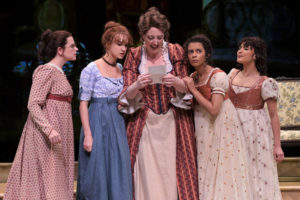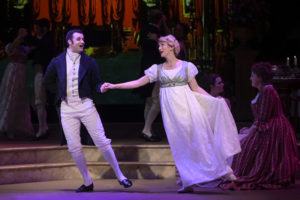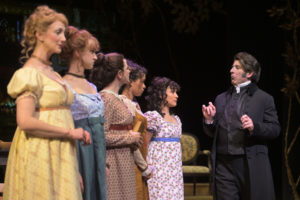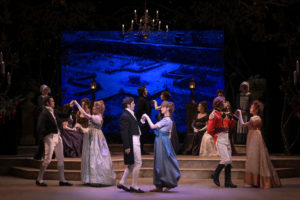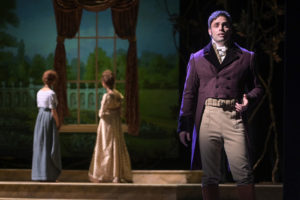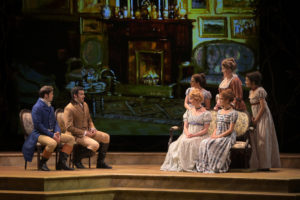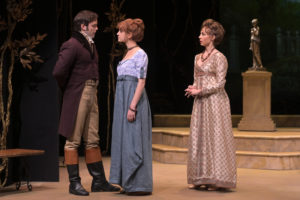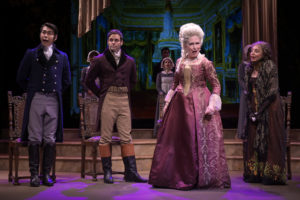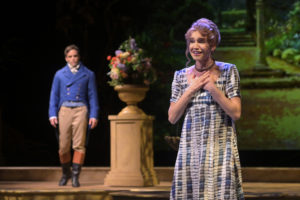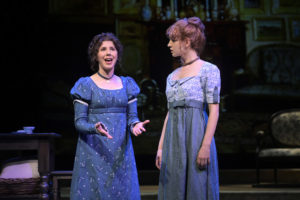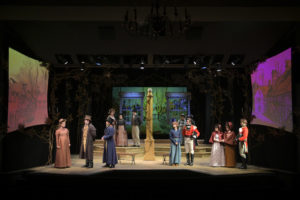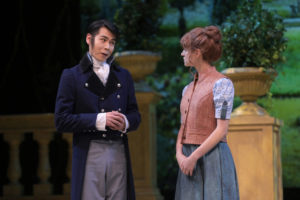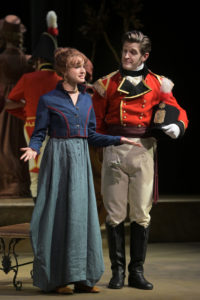LOST IN AUSTEN
All of Jane Austen’s novels are built on the same premise. A woman meets and marries an eligible man after a series of usually comic difficulties. But Austen extracts a remarkable amount of drama, comedy, and human interest from her domestic tales through her witty, ironic prose and her shrewd but forgiving eye for human weakness. Perhaps her best-known novel, its rich tapestry of characters and urbane dialogue have made it a natural for the stage, television, and motion pictures. With a stylish adaptation and scintillating performances some productions have been able to capture the culture of genteel English provincial life in the early nineteenth century.
It’s a shame that Paul Gordon’s musical adaption has songs which mostly weaken Austen’s tale as they have a lack of consistency, style, and sophistication. Bookwriter, lyricist and composer, Mr. Gordon has already adapted two other Austen novels into musicals: 2015’s Sense and Sensibility at Chicago Shakespeare — a much more agreeable show, but also stuck between the modern and Georgian eras — and Emma, which opens Jan. 2020 at the same venue. His adaptation here, while capturing the story and outline, does not stay true to the often sardonic but reserved tone of the original novel, and is inappropriate to the source material. It’s also strangely lacking in humor.
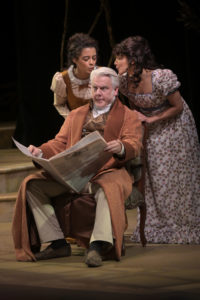 The songs are a mash-up of styles — most soft-pop with a few rock power ballads, and some inner monologues and Broadway children’s theater-esque bounce. In many cases the words run on and on in front of easy melodies, meaning the problem with the score is not that it is mostly pop-infused; it’s that the melodies lack character. And the imperfect rhymes can be criminal: “reassess” with “prejudice” and “Pemberly” with “tenderly” and “closely” with “mostly” don’t fall on the ear easily in the theater. It’s musical theater treacle.
The songs are a mash-up of styles — most soft-pop with a few rock power ballads, and some inner monologues and Broadway children’s theater-esque bounce. In many cases the words run on and on in front of easy melodies, meaning the problem with the score is not that it is mostly pop-infused; it’s that the melodies lack character. And the imperfect rhymes can be criminal: “reassess” with “prejudice” and “Pemberly” with “tenderly” and “closely” with “mostly” don’t fall on the ear easily in the theater. It’s musical theater treacle.
As TheatreWorks’ world premiere proves, the best thing about Pride and Prejudice is Austen herself. Robert Kelly’s production is pleasant enough if your standards are low (what’s the equivalent of Hallmark for the British-set?), and I must say that the cast is often quite good. That is, when actors who are allowed to inhabit a character — versus the two leads who, when screaming grating pop-like top-notes, seem content to make this show about life behind the barricades rather than a refined and chivalrous love story. Joe Ragey creates a nice if simple set with colorful video and projections. And the audience seemed to love it.
Pride and Prejudice takes us into the home of the Bennet family, Mr. and Mrs. Bennet and their five unmarried daughters living in Meryton in the county of Hertfordshire. The local society resembles a giant marriage market, with the eligibility of single men pegged to their annual income (5,000 pounds a year is desirable and 10,000 pounds a year makes the bachelor the lodestar of every ambitious mother and simpering daughter in the county).
Elizabeth Bennet is the high spirited and independent daughter in the Bennet clan. Opposite her is Mr. Darcy, one of the 10,000 pounds a year bachelors, a haughty young man who does not suffer fools gladly and sees fools all around him in Hertfordshire, especially female fools. Elizabeth and Darcy are clearly destined to be united, but in Austenian fashion they at first antagonize each other, their conflicts intensified by a series of misunderstandings. By the end of the story, Darcy relinquishes his stiff-necked pride and Elizabeth yields her prejudice against him and they unite in which should be an exceptionally lively and affectionate marriage.
It’s interesting to notice that the most successful character adaptations — Lucinda Hitchcock Cones is first rate as the Olympian Lady Catherine de Bourgh, and Christopher Vettel spot-on as Mr. Bennett — don’t have songs. Liz’s song “Headstrong” tells us what we already know, and her modern sense and sensibility shows no conflict about her relationship to society or family. Later in Act II, the song is reprised, yet does nothing to heighten emotion when she learns that she’s misjudged Mr. Darcy; why not a song in which she fears that she’s screwed everything up by being so headstrong?
The real hero of the evening is Jane Austen, with her mastery of sophisticated language, her sure eye for human weakness, and her delightful portrayals of provincial everyday life.
Pride & Prejudice
TheatreWorks
Lucie Stern Theatre
1305 Middlefield Road in Palo Alto
ends on January 4, 2020
for tickets, call 650.463.1960
or visit TheatreWorks

